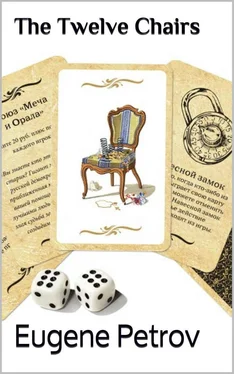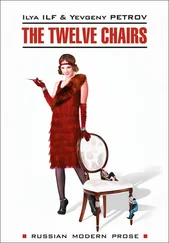Eugene Petrov - The Twelve Chairs
Здесь есть возможность читать онлайн «Eugene Petrov - The Twelve Chairs» весь текст электронной книги совершенно бесплатно (целиком полную версию без сокращений). В некоторых случаях можно слушать аудио, скачать через торрент в формате fb2 и присутствует краткое содержание. Год выпуска: 2013, Жанр: Юмористическая проза, на английском языке. Описание произведения, (предисловие) а так же отзывы посетителей доступны на портале библиотеки ЛибКат.
- Название:The Twelve Chairs
- Автор:
- Жанр:
- Год:2013
- ISBN:нет данных
- Рейтинг книги:5 / 5. Голосов: 1
-
Избранное:Добавить в избранное
- Отзывы:
-
Ваша оценка:
- 100
- 1
- 2
- 3
- 4
- 5
The Twelve Chairs: краткое содержание, описание и аннотация
Предлагаем к чтению аннотацию, описание, краткое содержание или предисловие (зависит от того, что написал сам автор книги «The Twelve Chairs»). Если вы не нашли необходимую информацию о книге — напишите в комментариях, мы постараемся отыскать её.
Find traces of a separate headset difficult and heroes face different adventures and troubles.
The Twelve Chairs — читать онлайн бесплатно полную книгу (весь текст) целиком
Ниже представлен текст книги, разбитый по страницам. Система сохранения места последней прочитанной страницы, позволяет с удобством читать онлайн бесплатно книгу «The Twelve Chairs», без необходимости каждый раз заново искать на чём Вы остановились. Поставьте закладку, и сможете в любой момент перейти на страницу, на которой закончили чтение.
Интервал:
Закладка:
place where the people of Pyatigorsk allow the sightseers in free. I will
remove that blemish on the town's escutcheon and rectify the regrettable
omission."
And Ostap acted as his reason, instinct, and the situation in hand
prompted.
He stationed himself at the entrance to the Drop and, rustling the
receipt book, called out from time to time:
"Buy your tickets here, citizens. Ten kopeks. Children and servicemen
free. Students, five kopeks. Non-union members, thirty kopeks!"
It was a sure bet. The citizens of Pyatigorsk never went to the Drop,
and to fleece the Soviet tourists ten kopeks to see "Something" was no great
difficulty. The non-union members, of whom there were many in Pyatigorsk,
were a great help.
They all trustingly passed over their ten kopeks, and one ruddy-cheeked
tourist, seeing Ostap, said triumphantly to his wife:
"You see, Tanyusha, what did I tell you? And you said there was no
charge to see the Drop. That couldn't have been right, could it, Comrade?"
"You're absolutely right. It would be quite impossible not to charge
for entry. Ten kopeks for union members and thirty for non-members."
Towards evening, an excursion of militiamen from Kharkov arrived at the
Drop in two wagons. Ostap was alarmed and was about to pretend to be an
innocent sightseer, but the militiamen crowded round the smooth operator so
timidly that there was no retreat. So he shouted in a rather harsh voice:
"Union members, ten kopeks; but since representatives of the militia
can be classed as students and children, they pay five kopeks."
The militiamen paid up, having tactfully inquired for what purpose the
money was being collected.
"For general repairs to the Drop," answered Ostap boldly. "So it won't
drop too much."
While the smooth operator was briskly selling a view of the malachite
puddle, Ippolit Matveyevich, hunching his shoulders and wallowing in shame,
stood under an acacia and, avoiding the eyes of the passers-by, mumbled his
three phrases. "M'sieu, je ne mange pas six jours. . . . Geben Sle Mir. . ."
People not only gave little, they somehow gave unwillingly. However, by
exploiting his purely Parisian pronunciation of the word mange and pulling
at their heart-strings by his desperate position as an ex-member of the
Tsarist Duma, he was able to pick up three roubles in copper coins.
The gravel crunched under the feet of the holidaymakers. The orchestra
played Strauss, Brahms and Grieg with long pauses in between. Brightly
coloured crowds drifted past the old marshal, chattering as they went, and
came back again. Lermontov's spirit hovered unseen above the citizens trying
matsoni on the verandah of the buffet. There was an odour of eau-de-Cologne
and sulphur gas.
"Give to a former member of the Duma," mumbled the marshal.
"Tell me, were you really a member of the State Duma?" asked a voice
right by Ippolit Matveyevich's ear. "And did you really attend meetings? Ah!
Ah! First rate!"
Ippolit Matveyevich raised his eyes and almost fainted. Hopping about
in front of him like a sparrow was Absalom Vladimirovich Iznurenkov. He had
changed his brown Lodz suit for a white coat and grey trousers with a
playful spotted pattern. He was in unusual spirits and from time to time
jumped as much as five or six inches off the ground. Iznurenkov did not
recognize Ippolit Matveyevich and continued to shower him with questions.
"Tell me, did you actually see Rodzyanko? Was Purishkevich really bald?
Ah! Ah! What a subject! First rate!"
Continuing to gyrate, Iznurenkov shoved three roubles into the confused
marshal's hand and ran off. But for some time afterwards his thick thighs
could be glimpsed in various parts of the Flower Garden, and his voice
seemed to float down from the trees.
"Ah! Ah! 'Don't sing to me, my beauty, of sad Georgia.' Ah! Ah! They
remind me of another life and a distant shore.' 'And in the morning she
smiled again.' First rate!"
Ippolit Matveyevich remained standing, staring at the ground. A pity he
did so. He missed a lot.
In the enchanting darkness of the Pyatigorsk night, Ellochka Shukin
strolled through the park, dragging after her the submissive and newly
reconciled Ernest Pavlovich. The trip to the spa was the finale of the hard
battle with Vanderbilt's daughter. The proud American girl had recently set
sail on a pleasure cruise to the Sandwich Isles in her own yacht.
"Hoho!" echoed through the darkness. "Great, Ernestula! Ter-r-rific!"
In the lamp-lit buffet sat Alchen and his wife, Sashchen. Her cheeks
were still adorned with sideburns. Alchen was bashfully eating shishkebab,
washing it down with Kahetinsky wine no. 2, while Sashchen, stroking her
sideburns, waited for the sturgeon she had ordered.
After the liquidation of the second pensioners' home (everything had
been sold, including the cook's cap and the slogan, "By carefully
masticating your food you help society"), Alchen had decided to have a
holiday and enjoy himself. Fate itself had saved the full-bellied little
crook. He had decided to see the Drop that day, but did not have time. Ostap
would certainly not have let him get away for less than thirty roubles.
Ippolit Matveyevich wandered off to the spring as the musicians were
folding up their stands, the holidaymakers were dispersing, and the courting
couples alone breathed heavily in the narrow lanes of the Flower Garden.
"How much did you collect?" asked Ostap as soon as the marshal's
hunched figure appeared at the spring.
"Seven roubles, twenty-nine kopeks. Three roubles in notes. The rest,
copper and silver."
"For the first go-terrific! An executive's rate! You amaze me, Pussy.
But what fool gave you three roubles, I'd like to know? You didn't give him
change, I hope?"
"It was Iznurenkov."
"What, really? Absalom! Why, that rolling stone. Where has he rolled
to! Did you talk to him? Oh, he didn't recognize you!"
"He asked all sorts of questions about the Duma. And laughed."
"There, you see, marshal, it's not really so bad being a beggar,
particularly with a moderate education and a feeble voice. And you were
stubborn about it, tried to give yourself airs as though you were the Lord
Privy Seal. Well, Pussy my lad, I haven't been wasting my time, either.
Fifteen roubles. Altogether that's enough."
The next morning the fitter received his money and brought them two
chairs in the evening. He claimed it was not possible to get the third chair
as the sound effects were playing cards on it.
For greater security the friends climbed practically to the top of
Mashuk.
Beneath, the lights of Pyatigorsk shone strong and steady. Below
Pyatigorsk more feeble lights marked Goryachevodsk village. On the horizon
Kislovodsk stood out from behind a mountain in two parallel dotted lines.
Ostap glanced up at the starry sky and took the familiar pliers from
his pocket.
CHAPTER THIRTY-SEVEN
THE GREEN CAPE
Engineer Bruns was sitting on the stone verandah of his little wooden
house at the Green Cape, under a large palm, the starched leaves of which
cast narrow, pointed shadows on the back of his shaven neck, his white
shirt, and the Hambs chair from Madame Popov's suite, on which the engineer
was restlessly awaiting his dinner.
Bruns pouted his thick, juicy lips and called in the voice of a
petulant, chubby little boy:
"Moo-oosie!"
The house was silent.
Читать дальшеИнтервал:
Закладка:
Похожие книги на «The Twelve Chairs»
Представляем Вашему вниманию похожие книги на «The Twelve Chairs» списком для выбора. Мы отобрали схожую по названию и смыслу литературу в надежде предоставить читателям больше вариантов отыскать новые, интересные, ещё непрочитанные произведения.
Обсуждение, отзывы о книге «The Twelve Chairs» и просто собственные мнения читателей. Оставьте ваши комментарии, напишите, что Вы думаете о произведении, его смысле или главных героях. Укажите что конкретно понравилось, а что нет, и почему Вы так считаете.












